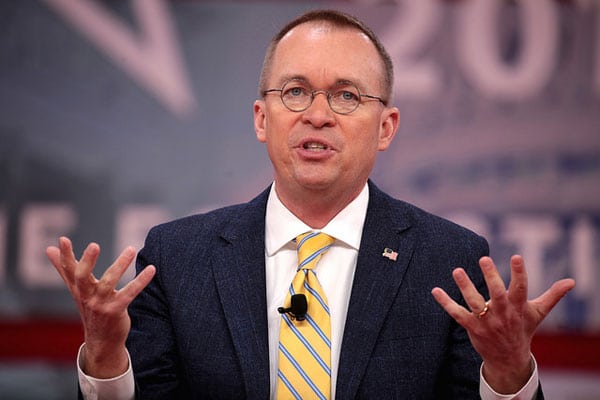
June 21, 2018; Washington Post, New York Times, and The Hill
Last week, the White House released a document entitled Delivering Government Solutions in the 21st Century: Reform Plan and Reorganization Recommendations. Officials said this plan for reorganizing the federal government was spearheaded by Budget Director Mick Mulvaney and based on a blueprint from a 2017 list of recommendations produced by the conservative Heritage Foundation. The 132-page document depicts a federal government that reflects the conservative values of its developers, reducing the size of the government’s footprint and eliminating and consolidating functions. The release was met with applause from some and great skepticism and opposition from others. Since many of these changes will need Congressional action and approval, and even some Republicans are not on board with many of these changes, this could be a long and drawn out process.
Some of the key proposed changes involved merging entire agencies. The Department of Education and the Department of Labor, under this proposal, would become the Department of Education and the Workforce. This is, noted the New York Times, a “back to the future” move, as President Jimmy Carter split the Department of Health, Education, and Welfare into two departments—Education and Health and Human Services—because no single department could handle all of these functions. Merging Labor and Education might cause similar issues. Further, this document suggests the Trump administration sees the function of education as almost solely related to workforce development, which extremely narrows the scope of education. In a capitalist economy that is increasingly extractive, this is a cause for concern.
Response to the Trump proposal on the part of legislators has been swift and strident.
The reorganization plan faces tough odds in Congress, where even aside from the dispute over work requirements, any reorganization faces opposition from congressional committees that could lose power if their jurisdictions change.
Sen. Patty Murray (D-WA), the top Democrat on the Senate Health, Education, Labor and Pensions Committee, dismissed the plan as dead on arrival even before it was official unveiled, calling it a move to propose “futile reorganizations of the federal government just to have a new talking point.”
Sign up for our free newsletters
Subscribe to NPQ's newsletters to have our top stories delivered directly to your inbox.
By signing up, you agree to our privacy policy and terms of use, and to receive messages from NPQ and our partners.
“Democrats and Republicans in Congress have rejected President Trump’s proposals to drastically gut investments in education, health care, and workers—and he should expect the same result for this latest attempt to make government work worse for the people it serves,” she added.
Others see this reorganization as an attack on government workers and unions, since no numbers were given as to how many jobs will be lost or gained in its implementation.
The American Federation of Government Employees, the largest union representing federal workers, promptly assailed the plan as a “scheme to gut federal services,” in part by targeting domestic programs that have long been unpopular with conservatives.
“There’s little reason to believe this reorganization plan is anything more than a scheme to eliminate essential programs and public-service jobs, reward or punish political appointees depending on their allegiance to the White House, and privatize government programs to reward political donors,” AFGE President J. David Cox Sr. said in a statement.
Via this process, Mulvaney is looking to eliminate a range of public agencies, such as the Consumer Financial Protection Bureau, the Corporation for Public Broadcasting, and the Import-Export Bank. He also hopes to privatize the US Postal Service, the Federal Aviation Administration, and other parts of the federal government via this plan. Some of the changes can be done by presidential orders or initiated through the Office of Management and Budget (OMB). Most, however, require Congressional action. The report does little to specify which are which, and this means that all of us are left to be on constant watch as this develops—at whatever pace it moves forward. So, be vigilant, but do not expect it to happen quickly…or easily…or as laid out in this proposal…or, with some components, perhaps at all.—Carole Levine













